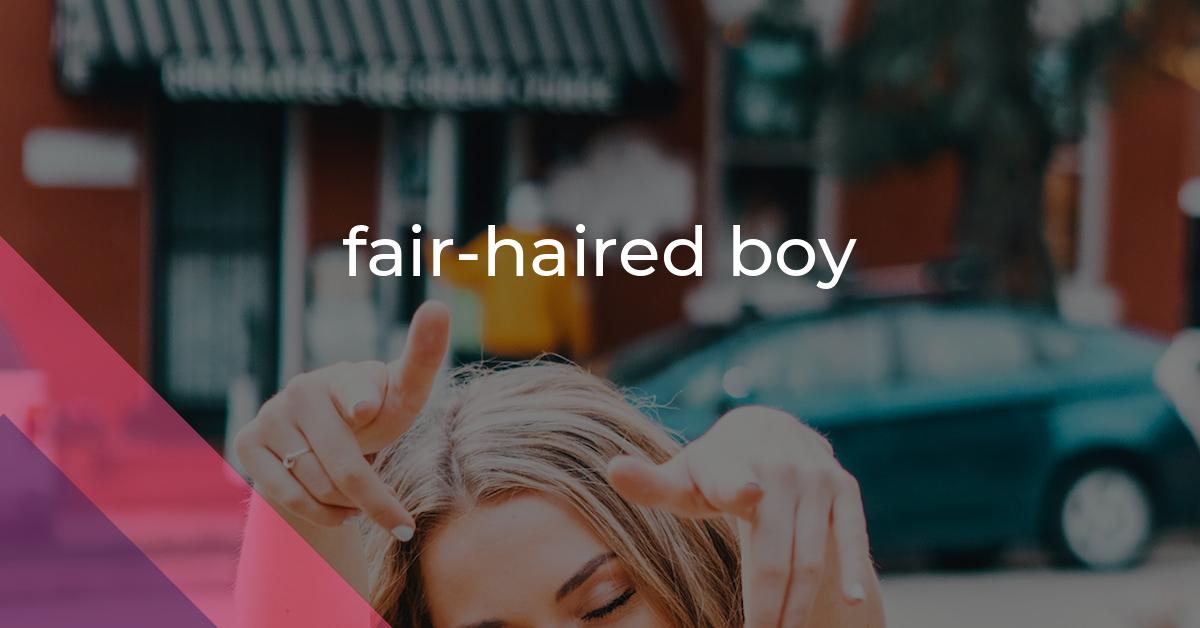fair-haired boy: Idiom Meaning and Origin
What does ‘fair-haired boy’ mean?
The idiom fair-haired boy refers to someone who is favored or treated with special attention because of their exceptional qualities or abilities.

Idiom Explorer
The idiom "hot stuff" is used to describe someone or something that is outstanding, remarkable, or highly skilled.
The idiom "high and mighty" means that someone is arrogant, haughty, or acting superior to others. It refers to someone who thinks they are better or more important than everyone else.
The idiom "have someone by the short hairs" means to have someone in a position of complete control or power, making them unable to escape or avoid a certain situation or demand.
The idiom "have a head for" means to be naturally skilled or talented in a particular area or to have a knack for something.
The idiom "have a fable for" means to have a strong liking or preference for something or someone, often to an excessive or irrational degree. It suggests a passion or infatuation that may not be based on reason or practicality.
The idiom "hard done by" refers to feeling unfairly treated or disadvantaged in a situation. It implies a sense of experiencing hardship or being poorly treated in comparison to others.
The idiom "good old boy" refers to a person, typically a man, who is seen as trustworthy, loyal, and part of a close-knit community or group. It often implies that this person follows traditional values and has influence or connections within that community.
The idiom "good looker" refers to a person who is physically attractive or visually pleasing.
The idiom "good books" refers to being in a position of favor or under the protection of someone influential or powerful. It implies that the person is in a positive and secure state, likely due to their relationship with someone important.
The idiom "God's gift to women" is used to describe a man who believes he is incredibly attractive or desirable to women. It implies that he sees himself as a special or superior gift from God to women.
"Revealing Timeless Favorites"
The idiom "fair-haired boy" has been a popular expression in the English language since the early 19th century. It describes a person, usually a young man, who is treated with special preference or favor, often by someone in a position of power or authority. This idiom is also associated with notions of innocence and naivety.
The origin of the idiom can be traced back to ancient Greek mythology, specifically the story of Achilles and Patroclus. Patroclus, a beloved companion and close friend of Achilles, was known for his golden hair, which was said to be a sign of divine favor. This association of fair or golden hair with special treatment may have influenced the development of the idiom "fair-haired boy."
Another possible source of the idiom can be found in the idealization of fair or blond hair in many cultures. Fair hair has often been associated with youth, beauty, and innocence. This connection may have contributed to the idiom's usage in describing someone who is perceived as innocent or untarnished.
The idiom "fair-haired boy" became popular in the United States during the early 20th century, particularly in political and business contexts. It was used to describe individuals who were viewed as being in a position of great favor or being groomed for success. The association with youth and innocence enhanced the idiom's sense of potential and promise.
Over time, the idiom has expanded beyond politics and business and is now commonly used to describe anyone who receives special treatment or high regard from someone in authority. The idiom carries connotations of privilege, favoritism, and the potential for greatness.
One related idiom is "blue-eyed-boy-idiom-meaning-and-origin/">blue-eyed boy." This expression is used to describe someone who is highly favored or regarded by someone in a position of power. The phrase originated in the early 20th century and likely draws upon the same notions of innocence and favoritism associated with the "fair-haired boy" idiom.
Another related idiom is simply "blue-eyed." This phrase describes someone who is naive, innocent, or easily deceived. It can be used in various contexts to convey someone's gullibility or lack of experience.
The idiom "fair sex" is yet another related phrase. It is used to refer to women and is believed to have originated in the 14th century. The word "fair" in this context refers to beauty and is a reflection of earlier cultural ideals that valued fairness in women.
"fair game" is another idiom that is related to the concept of fairness. This phrase is commonly used to describe a person or situation that is considered open to criticism, attack, or competition. The notion of fairness in this context refers to an equal opportunity or a level playing field.
The final related idiom is "fresh-faced." This expression is used to describe someone who appears young, innocent, or cheerful. It can also convey a sense of vitality or energy. The idiom draws upon the association of fair or youthful-looking skin with a sense of freshness and vigor.
The origin of the idiom "fair-haired boy" is not definitively known, but it likely draws upon ancient mythology and cultural ideals of beauty. Regardless of its exact origins, the idiom has evolved and endured, taking on new meanings and interpretations in different contexts. It remains a powerful expression to describe someone who is seen as privileged or favored, carrying an air of promise and potential. The related idioms "blue-eyed boy," "blue-eyed," "fair sex," "fair game," and "fresh-faced" further emphasize the nuanced meanings and connotations associated with the idiom "fair-haired boy."
Example usage
Examples of how the idiom "fair-haired boy" can be used in a sentence:
1. He became the fair-haired boy of the company after his successful presentation.
2. Despite being new to the team, she quickly became the fair-haired boy due to her exceptional skills.
3. The manager's fair-haired boy was given all the prestigious assignments and promotions.
More "success" idioms



